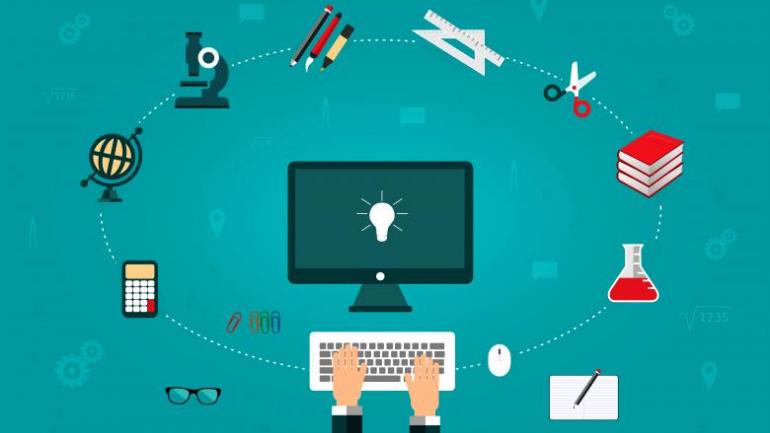As we stand on the precipice of a new era, the future of education is undergoing a transformative shift. This blog post aims to navigate the evolving landscape of education by examining the latest trends and predictions that are shaping the way we teach and learn. From the integration of cutting-edge technologies to the emergence of personalized learning, let’s explore the exciting developments that are redefining the educational experience for students around the globe.

1. Technology Integration in Education
a. Online Learning Platforms
- Trend: The rise of online learning platforms continues to revolutionize education, providing learners with flexibility and accessibility.
- Prediction: The future will see even more sophisticated online learning environments, fostering collaborative and interactive experiences.
b. Virtual and Augmented Reality
- Trend: Virtual and augmented reality are becoming integral tools in education, offering immersive learning experiences.
- Prediction: These technologies will evolve to create more realistic simulations, enhancing experiential learning across various subjects.
c. Artificial Intelligence (AI) in Education
- Trend: AI is being used for personalized learning, adaptive assessments, and intelligent tutoring systems.
- Prediction: AI will play a more prominent role, offering tailored learning experiences and real-time feedback to individual students.
2. Personalized Learning Approaches
a. Adaptive Learning Platforms
- Trend: Adaptive learning platforms use data and analytics to tailor educational content to individual student needs.
- Prediction: The future will witness further refinement of adaptive learning algorithms, ensuring even more personalized and effective education.
b. Competency-Based Education
- Trend: Competency-based education focuses on students mastering skills at their own pace rather than adhering to a traditional academic calendar.
- Prediction: This approach will gain traction, providing a more flexible and student-centric learning experience.
c. Individualized Learning Paths
- Trend: Schools and educators are increasingly recognizing the importance of allowing students to choose their learning paths.
- Prediction: Education will become more tailored to students’ interests and aspirations, fostering a deeper engagement with the learning process.
3. Globalization of Education
a. International Collaborations
- Trend: Collaborative efforts between educational institutions globally are on the rise, facilitating cultural exchange and knowledge-sharing.
- Prediction: Increased international partnerships will lead to the development of globally recognized education standards and qualifications.
b. Remote and Distance Learning Opportunities
- Trend: The ability to learn from anywhere in the world is becoming more prevalent, breaking down geographical barriers.
- Prediction: The future will see an even greater emphasis on remote and distance learning options, providing access to education for diverse global populations.
c. Global Competency Education
- Trend: Educational programs are incorporating global competency elements to prepare students for an interconnected world.
- Prediction: Global competency education will become a standard part of curricula, emphasizing cross-cultural communication and understanding.
4. Emphasis on 21st-Century Skills
a. Critical Thinking and Problem-Solving
- Trend: There is a growing recognition of the importance of cultivating critical thinking and problem-solving skills.
- Prediction: Educational institutions will prioritize the development of these skills to prepare students for the challenges of the future workforce.
b. Digital Literacy
- Trend: Digital literacy is increasingly crucial in the digital age, encompassing skills like information literacy and online communication.
- Prediction: Digital literacy will become a foundational skill, integrated into curricula across all disciplines.
c. Creativity and Innovation
- Trend: There is a shift toward fostering creativity and innovation in education to nurture students’ ability to think outside the box.
- Prediction: Educational programs will incorporate more creative learning approaches, encouraging students to explore and express their ideas.
5. Innovative Teaching Methods
a. Project-Based Learning
- Trend: Project-based learning emphasizes hands-on experiences and collaborative projects.
- Prediction: This approach will gain prominence, fostering a deeper understanding of subjects and promoting teamwork.
b. Gamification of Education
- Trend: Gamification is being used to enhance engagement and motivation in the learning process.
- Prediction: The integration of gamification will expand, making education more interactive and enjoyable for students.
c. Flipped Classroom Models
- Trend: Flipped classrooms involve students learning content at home through digital resources, allowing class time for discussions and activities.
- Prediction: The flipped model will continue to evolve, encouraging more student-centered and interactive classroom environments.
Overcoming Challenges in the Future of Education
1. Access to Technology
- Challenge: The digital divide poses a challenge, with some students lacking access to necessary technology.
- Solution: Efforts must be made to bridge this gap, ensuring equitable access to technology for all students.
2. Teacher Training and Professional Development
- Challenge: Educators need training to effectively integrate new technologies and teaching methods into their classrooms.
- Solution: Ongoing professional development programs should be provided to equip teachers with the skills needed for the future of education.
3. Balancing Standardization and Personalization
- Challenge: Balancing standardized assessments with personalized learning approaches can be challenging.
- Solution: Education systems should seek a harmonious approach that values individual growth while maintaining necessary standards.
Success Stories and Testimonials
1. Improved Student Outcomes
- Success: Share stories of students who have thrived in the evolving educational landscape, showcasing improved academic performance and personal development.
2. Innovative Teaching Approaches
- Success: Highlight success stories of educators who have successfully implemented innovative teaching methods, demonstrating the positive impact on student engagement and learning outcomes.
Conclusion
In conclusion, the future of education holds tremendous promise, marked by transformative trends and predictions that aim to redefine the learning experience. From the integration of advanced technologies to a focus on personalized learning and the development of 21st-century skills, education is evolving to meet the dynamic needs of students in the 21st century. By embracing these trends and overcoming associated challenges, educators and institutions can pave the way for a more inclusive, engaging, and impactful educational future.
